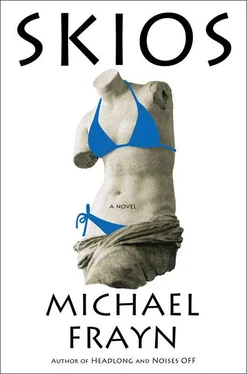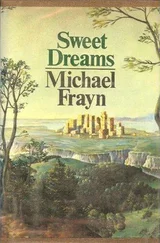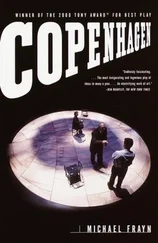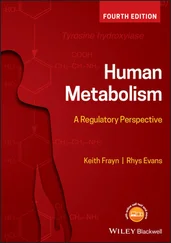“Patrick’s the one who’s coming with the taxi?”
“Patrick? Why should it be Patrick? Patrick’s in Turkey.”
Dr. Wilfred’s hands stopped short, somewhere around the third thoracic vertebra.
“If it was Patrick,” said Georgie, “he would be here. With an adapter. And a spare one, in case the first one broke down. And water-purifying tablets. And an antimosquito thing. And a jar of Marmite.”
“But this person who is coming … The one with the taxi…”
“Oliver.”
“Oliver. You’ve really no idea when?”
“Not the foggiest.”
Dr. Wilfred fell back into despair. “I’ve got to get to this place I’m going and I’ve got to find some clean clothes to put on and I don’t know when I’m supposed to be there and I don’t know where it is and I don’t know how long it’s going to take me to get there. I don’t even know where we are now ! So where in fact are we?”
“Search me. Ask Oliver when he arrives. Look, are you putting sunblock on me or aren’t you?”
His hands resumed their journey down her spine.
“Not down there,” she said. “Don’t get any ideas.”
* * *
“So clever of Nikki to find you!” said Mrs. Toppler as Dr. Wilfred worked away on a spot just to the left and up a bit from her coccyx. “Magic fingers, as well as everything else.”
The doors to the loggia had opened, realized Dr. Wilfred. A short, trim man in a naval blazer and a club tie had stopped in the doorway, and was gazing at the scene with expressionless blue eyes.
“Thank you,” said Mrs. Toppler to Dr. Wilfred. “That really felt nice. We’ll do that again.”
A thundercloud of flesh, now transmuted into piled summer cumulus by white shirt and chinos, was ushering the well-muscled blazer in. “You remember Oleg?” said Mr. Papadopoulou to Mrs. Toppler. “He was here last year also. Oleg Skorbatov.”
“Hi, Oleg!” said Mrs. Toppler as she did her trousers up. “And this is Dr. Wilfred, who’s giving the lecture this evening.”
“Big star,” said Mr. Papadopoulou. “World famous.”
“And you know what?” said Mrs. Toppler. “Dr. Wilfred’s a doctor. On top of everything else. You got any aches or pains, Oleg, you bring them to Dr. Wilfred.”
Oleg Skorbatov’s unblinking blue eyes fixed on Dr. Wilfred for a moment. He nodded briefly.
“Oh, hi there!” said Mrs. Toppler to a young woman with unnaturally long legs who was standing in the doorway in her turn, topped by a piled brass hairdo that brought her up to almost the height of the architrave. “Svetlana! Great to see you again, Svetlana!”
“Tatiana, this one,” said Mr. Papadopoulou.
“Tatiana,” said Mrs. Toppler, as she kissed her. “Oh, Tatiana, that hair of yours is so brave!”
“Don’t trouble yourself,” said Oleg Skorbatov. “She doesn’t speak English.”
“OK,” said Mr. Papadopoulou, steering Oleg Skorbatov back into the house. “See you later, Dr. Wilfred. I have to show Oleg how we do with the new pool.”
“Men!” said Mrs. Toppler to Dr. Wilfred. “He shows Oleg the pool! He won’t let me see it! No one! Not even our wonderful Nikki knows what’s going on behind those screens! Wait there, Tatiana, honey, while I see Dr. Wilfred out.”
“May I ask you something?” said Dr. Wilfred to her as they left the loggia. “I’ve been thinking a lot recently about names. What were you before you were Bahama LeStarr?”
“Before I was Bahama LeStarr I was Apricot del Rio. You come back and give me another session, now. I want your advice about something.”
Georgie and Dr. Wilfred were having lunch in the shade of an ancient olive tree. She had unfrozen the contents of the freezer — half a sliced loaf and a packet of peas. He had found a jar of peanut butter. There didn’t seem to be anything else to eat in the house.
“That’s this great lecture you’re supposed to be giving, is it?” she said, nodding at the travel-worn binder on the table beside his plate. “You could read it to me instead.”
He looked at it distractedly. He had been thinking about the two moles on her left shoulder blade, which had now vanished, like so much else, inside a T-shirt. He put out his hand to touch the binder, to reassure himself that his lecture at least was still here.
“No, no!” she said. “Joke! Save it up for people who’ll understand it! And they paid your fare to come here, did they, Wilfred? What — economy or business?”
“Business.”
“So you’re someone important?”
He said nothing. Each time she called him Wilfred he felt less like someone important and more as if he were back in school again, stuck in timeless alphabetical order between Walters and Wilkins.
“I’m trying to get a conversation going,” she said. “To keep you entertained, so you don’t brood about your lecture.”
He sighed. “Am I important?” he said. “Yes. As a matter of fact. In my field. Among people who are interested in the scientific management of science.”
She rested her elbows on the table and her chin in her hands, gazing at him, apparently fascinated. He didn’t really suppose that she was, but it was difficult not to respond when someone was staring open-eyed straight into your face at a range of about two feet.
“My area of expertise is the funding of research,” he said. “I write books and articles about it. I advise governments and the UN. Since you ask.”
He looked at the view for some time, but he realized she was still gazing at him as expectantly as ever.
“Research is very expensive,” he said. “Someone has to recommend what research should be supported. You probably think scientists just have sudden brainwaves, or they do experiments with two tin cans and a piece of string in their garage, or they find things they hadn’t been looking for.”
She didn’t deny it.
“But scientists aren’t just a lot of mad professors,” he said. “They’re rational human beings, just like you and me, engaged in a rational human activity which is subject to rational human constraints. The results of scientific research are scientifically measurable. We have developed a discipline for this. It’s called scientometrics. And on the basis of scientometrics science can be scientifically managed.”
“This is your lecture, is it?” she said. “I see why you don’t want people to miss it.”
Those two hidden moles had resurfaced in his brain, so to push them back underground again he went on.
“This is not actually my lecture,” he said. “I’m giving you a little private tuition. I just want to make clear to you for your own benefit that the view some people have of scientists and scientific research is completely wrong. Scientists do of course sometimes have eureka moments, and they do of course sometimes find important results they weren’t looking for. But it’s all still perfectly rational. You can always find a clear causal chain when you look for it. If the answer to a problem suddenly clicks into place in someone’s brain it’s because they’ve already done all the thinking. They know there’s a problem that needs a solution, just like you know there’s a space in the jigsaw that needs a piece to fit it. Scientists aren’t poets! But then poets aren’t irrational, either. Not that I know much about poets, but I’m pretty certain that they’re subject to the same causal laws as all the rest of us. They come up with words that fill a gap in the market, or they go out of business, just like everyone else.”
“Fascinating,” she said. “So you just thought all this up, did you, Wilfred?”
He was about to agree when he saw the trap he was being led into.
Читать дальше












